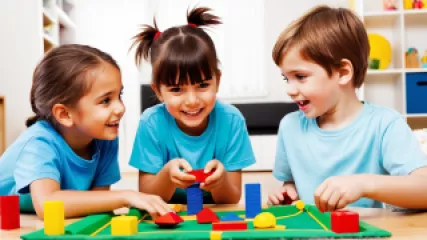How Can Sibling Therapy Programs Help Resolve Sibling Rivalry Issues?
Sibling rivalry is a common challenge that many parents face. When brothers and sisters constantly argue, fight, and compete for attention, it can create a tense and stressful environment within the family. Fortunately, there are strategies and resources available to help address these issues and promote sibling harmony. One such resource is sibling therapy programs, which aim to resolve sibling rivalry issues and improve communication and relationships between siblings. In this article, we will explore how sibling therapy programs can be beneficial in resolving sibling rivalry issues and fostering a healthy sibling relationship.
What is Sibling Therapy?
Sibling therapy is a form of family therapy that specifically focuses on addressing conflicts and improving relationships between siblings. It provides a safe and structured environment for siblings to express their feelings, understand each other's perspectives, and learn effective ways of resolving conflicts. Sibling therapy programs are usually facilitated by trained therapists or counselors who specialize in family dynamics and child development.
The Benefits of Sibling Therapy Programs
Sibling therapy programs offer various benefits that can positively impact both the individual siblings and the overall family dynamic. Let's explore some of these benefits:
1. Improved Communication Skills
One of the key objectives of sibling therapy programs is to enhance communication skills among siblings. Through guided discussions and activities, siblings learn how to express themselves effectively, actively listen to one another, and communicate their needs and boundaries in a respectful manner. These improved communication skills can extend beyond sibling interactions and positively impact other relationships in their lives.
2. Conflict Resolution Strategies
Sibling therapy equips siblings with essential conflict resolution strategies. They learn how to manage conflicts constructively, negotiate compromises, and find win-win solutions. By developing these skills, siblings can navigate disagreements more effectively and reduce the intensity and frequency of conflicts.
3. Understanding Sibling Dynamics
Sibling therapy programs provide a platform for siblings to gain a deeper understanding of their unique dynamics. They learn about birth order effects, individual differences, and the impact of family dynamics on their relationships. This understanding helps siblings develop empathy and appreciation for each other's perspectives, fostering a stronger bond between them.
4. Emotional Support
Sibling therapy programs create a supportive environment where siblings can express their emotions and experiences without judgment. This emotional support allows siblings to process their feelings, validate each other's experiences, and develop empathy. It also encourages open and honest communication, leading to increased trust and closeness among siblings.
5. Strengthened Sibling Bond
By participating in sibling therapy programs, siblings have the opportunity to engage in activities that promote bonding and cooperation. These activities may include collaborative games, shared projects, and team-building exercises. As siblings work together and experience success, their bond strengthens, leading to a more positive and harmonious relationship.
Who Can Benefit from Sibling Therapy Programs?
Sibling therapy programs can be beneficial for a wide range of families and sibling relationships. Whether the rivalry is mild or severe, seeking professional assistance can provide valuable guidance and support. Here are some scenarios where sibling therapy programs can be particularly helpful:
- Families experiencing frequent conflicts and tension between siblings
- Siblings engaging in physical aggression or verbal abuse
- Parents struggling to effectively intervene and address sibling conflicts
- Siblings with significant age gaps or developmental differences
- Families going through major life transitions (e.g., divorce, relocation, blending families)
It is important to note that sibling therapy programs are not only for families in crisis. They can also be a proactive approach to strengthen sibling relationships and prevent future conflicts.
How Do Sibling Therapy Programs Work?
Sibling therapy programs typically involve a series of sessions conducted by a trained therapist. The specific structure and duration of the program may vary depending on the needs of the siblings and the goals established with the therapist. Here is an overview of how sibling therapy programs generally work:
1. Initial Assessment
The therapist begins by conducting an initial assessment to gain a comprehensive understanding of the sibling relationship dynamics, individual personalities, and any underlying issues contributing to the rivalry. This assessment helps the therapist tailor the program to meet the specific needs of the siblings.
2. Goal Setting
Based on the assessment, the therapist collaborates with the siblings and their parents to establish clear goals for the therapy program. These goals may include improving communication, reducing conflicts, fostering empathy, or creating a more positive sibling relationship.
3. Therapeutic Interventions
The therapist employs various therapeutic interventions to address the identified issues and achieve the established goals. These interventions may include individual sessions with each sibling, joint sibling sessions, family sessions, and skill-building exercises. The therapist guides the siblings through discussions and activities that promote self-reflection, perspective-taking, and effective conflict resolution.
4. Homework Assignments
To reinforce the skills learned during therapy sessions, the therapist may assign homework activities for the siblings to practice between sessions. These assignments can include practicing active listening, engaging in collaborative projects, or using new conflict resolution strategies in real-life situations.
5. Ongoing Support
Sibling therapy programs often include ongoing support to ensure the sustainability of the progress made. The therapist may schedule follow-up sessions to monitor the siblings' relationship and provide additional guidance if needed. They may also offer resources and recommendations for maintaining a healthy sibling dynamic beyond the therapy program.
Conclusion
Sibling rivalry can be challenging for both children and parents, but it doesn't have to be a constant source of conflict. Sibling therapy programs offer valuable strategies and support to address these issues and promote sibling harmony. By improving communication skills, teaching conflict resolution strategies, fostering understanding of sibling dynamics, providing emotional support, and strengthening the sibling bond, these programs can help resolve sibling rivalry issues and create a more positive and supportive sibling relationship. If you are experiencing ongoing sibling conflicts, consider exploring sibling therapy programs as a means to support your children and foster a healthier family dynamic.






